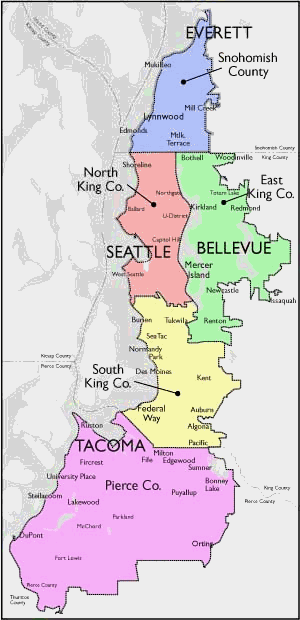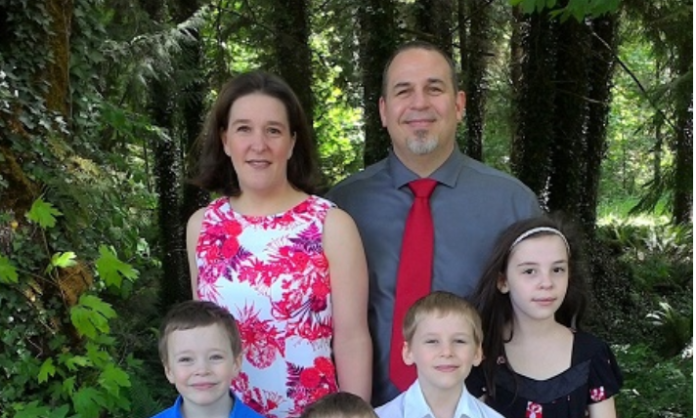As part of our endorsement process at The Urbanist, we ask candidates to complete a standard questionnaire to better understand and evaluate their positions on housing, land use, transportation, and other important issues. We then share this information with our readers to help inform their own voting decisions.
This year we are considering selected candidates running for US Congress, Washington State Legislature, and King County Prosecuting Attorney. We are publishing the questionnaires in full, concluding with our official general election endorsements in mid-October.
The following questionnaire was submitted by Ted Cooke running for Legislative District 47B (which includes parts of Auburn, Covington, and Kent) on the Republican ticket. Cooke’s opponent, Pat Sullivan (D-Covington), did not submit a questionnaire.
***
Rapid Fire
Do you consider yourself an urbanist?
No.
Do you support an income tax?
No.
Short Answer
How do we keep Sound Transit 3 (ST3) timelines on track given that the Trump administration is slow-walking or eliminating grants for transit projects and construction costs are skyrocketing?
I think ST3 should be put on hold indefinitely and a fraction of the amount spent on new roads and highways. ST3 was sold to voters under false premises. Voters were told the average adult would pay only $14 per month. That number assumes a total of around 12.5 million adults in the state all paying every month for 25 years. But there are only 7.4 million people total in the State. So the real cost would be $26 per month for every individual in the state–from a newborn in Okanogan to an elder on the Makah Reservation. [Editor’s note: Sound Transit taxes and fees only apply in the Sound Transit Taxing District which includes neither Okanogan or the Makah Reservation. The district includes the urbanized portion of King County, the southeast corner of Snohomish County, and urbanized Pierce County.]
Stretched along I-5 the 62 miles would not reach from the center of Olympia to North Seattle. If we want to do light rail we should re-purpose the many mile of existing railroad grade around the I-5 corridor which has had rails removed and been turned into biking and walking trails. It would cost pennies on the dollar to put back tracks, and several times more people would gain an hour or two per day riding the rail which they could use for exercise–and family, and hobbies–elsewhere.

What is your position on the Sound Transit car-tab tax? Would you support a plan that cuts Sound Transit’s budget?
I think ST3 was sold to the voters under false premises and should be put on hold indefinitely. Furthermore I believe that high car tab taxes place barriers to transportation for the 96% of families in the state who rely on automobiles, many of whom are poor and need cars and roads to have more education choices, more employment opportunities, and a better quality of life. I also believe Washington State’s fair and generally flat sales tax raises more than enough funds for State DOT to greatly alleviate traffic congestion if the dollars would simply be spent towards that purpose, not towards boutique rail, costly HOT lanes and restrictive toll bridges.
How will you leverage state resources to increase affordable housing?
The State legislature needs to ease both the Growth Management Act and environmental regulations which aren’t absolutely necessary in order to encourage more building in rural areas, which would result in more and cheaper housing for everyone. Right now the model is that in rural areas there can be only one house per 5 acres. Road construction is discouraged because it costs hundreds of thousands for road improvements per property front. Cities annex a rural area, pave it over entirely in the course of 20 years and build minimum roads to maximize tax base. Then, a couple decades later, they annex the next chunk of rural area and start over, which is an ecological disaster. Subsidized housing meanwhile has become a racket, where cities claim land at a fraction of it’s value using imminent domain, hand it over to developer lobbyists (following self interest) who put up inexpensive housing tax free, while permitting and environmental agencies charge top dollar. The taxpayers are getting taken to the cleaners at every step, and this kind of government waste ultimately hurts the chances for advancement of the lucky few who get into such housing by increasing their cost of living and payroll taxes.
Washington is ranked as having the most regressive tax code in the nation. Rich households pay a much lower effective tax rate than poor households. What, if anything, do you propose to do about that?
With a fair and flat tax like Washington State’s sales tax, rich households are not paying a lower State tax rate than poor households if they use a higher percentage of their income to buy things than a poor household does. Looking only at the State sales tax (the so called “regressive” tax, and that’s a loaded term) the only people who pay a “lower” tax rate are those who save a higher percentage of their income. It’s entirely possible for a poor household to save 10% of their income, and it’s entirely possible for a rich household to overspend 10% of their income (I’ve seen both of these things happen many times). Also, property taxes and transportation taxes (so called “progressive” taxes) create barriers to upward mobility for the very people such “progressive” taxes are supposed to be helping. Ultimately the best way we can reign in taxes for the poor and the rich is to spend less as a State government and shrink the current scope of State government.
How should our state address climate change and would you back a carbon tax bill similar to what Governor Inslee has proposed?
The Paris Accord would have penalized the U.S. while leaving the world’s greatest CO2 emitter and several comparable CO2 emitters untouched for decades. It hoped to realize a 0.2 degree Celsius reduction in overall global temperature by the year 2100. That number is within margin of error. Washington state emits about 80 million tons of CO2 per year, less than a large volcano. That 80 million tons is about 0.3 percent of worldwide human CO2 generation. I do not believe we should penalize the people of the State of Washington with economic sanctions which will fall hardest on the poor in order to possibly change global temperature by 0.3% of 0.2 degrees eighty years from now.
Would you vote to permit local transit agencies and police departments to implement camera enforcement of transit lanes in order to keep buses moving through traffic bottlenecks? Why or why not?
I believe that in general real-time electronic monitoring is what you do for a defendant who is a flight risk or a convict on probation, and that’s about it. I have a big problem with electronic monitoring of anyone who is not a criminal. I oppose red light cameras, HOT lanes, toll bridges, mandatory service cameras and automated speeding ticket cameras. More troubling than the fact that most of these measures are mainly financially motivated is what they do to a free human spirit. If government can mandate real-time monitoring of the truck I’m driving, or mandate that any person wear a camera at all times when on the job, then why not further ensure compliance with the law by having two way telescreens prominently placed in every room of every private home, so people could be monitored at any time? The terms “private” and “public” are rendered meaningless if a private person in any private (i.e., non-government) vehicle is subject to real time electronic monitoring by the state.
How can we protect and preserve the open spaces in Washington State?
In the Constitution of the United States (which the Washington State Constitution calls under it’s Article 1, Section 2, “the supreme law of the land”) the federal government is granted by Article 1, Section 8 only 10 square miles for a capital (D.C.) and needful land for buildings and military bases, that’s it. Originally the Northwest Ordinance gave the federal government temporary oversight of territories until such time as they could be formed into states. There is nothing constitutional about having the federal government own a large percentage of land in a given state. And it’s not necessarily wise for the State to own large portions of lands either, apart from cases of clear environmental need or compelling natural wonder (the rain forest, Mt. Rainier park, etc). One of the earlier sections of this questionnaire asked about affordable housing. We have more than enough land for everyone to have a home but much of the land in the state is tied up by unnecessary (and that’s the key word, unnecessary) public ownership. Yes, many great open spaces should be preserved. And at the same time, people’s rights to individual life, liberty and property should be preserved and protected as well.
What is your favorite mode of transportation and why?
Any mode involving my wife and family and a day off! Because time is life, and time spent with family, or doing a hobby, is priceless. (That’s part of why I’m a strong advocate for congestion relief in the form of building more roads and highways, BTW.) [Editor’s note: see our writing on induced demand to show why America’s repeated efforts to highway-build our way out of congestion has not worked and will never work in Seattle.]
The next time the state legislature crafts a major transportation funding package, what do you want to see in it?
I’d like to see ST3 put indefinitely on hold, see many retired existing railroad grades re-purposed for affordable light rail, see a major highway put in along the cascade foothills (with tie ins to 520, 18, 410, etc.) and see more inter-regional major roads put in. Uber and self-driving cars are coming. By 2041, the target date of ST3, they will have taken a meaningful percentage of Metro’s business, because unlike mass transit they can go from point A to point B for pennies on the dollar. We are going to need new roads and that’s a good thing. We are growing as a State. We are a place of opportunity and income mobility for immigrants and the poor.

Elections Committee
The Urbanist was founded in 2014 to examine and influence urban policies. We believe cities provide unique opportunities for addressing many of the most challenging social, environmental, and economic problems. We serve as a resource for promoting urbanism, increasing political participation, and improving the places we live. The Elections Committee consists of community volunteers and staff members of The Urbanist and is a standing body representing the political values of our organization.

